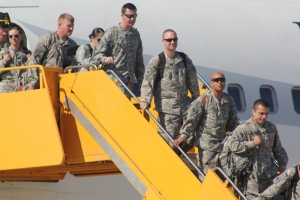Grant to Help Demobilizing National Guard Members
April 30, 2014 / by Claudia Bustamante- Giving
- Research
The Center for Innovation and Research on Veterans & Military Families (CIR) at the USC School of Social Work received funding from the Science Applications International Corporation (SAIC) to help publicize the unique transitional challenges facing National Guard and Reserve service members.
The $100,000 gift funded the development of manuscripts and a report on the findings from the Reintegration Partnership Project (RPP), a pilot program that provided reintegration skills training to National Guard members and their spouses, and evaluated its perceived effectiveness in helping them manage post-deployment challenges.
Launched in 2011, the program was a partnership between the California National Guard, the Los Angeles County Department of Mental Health, CIR and SAIC.
SAIC, a Fortune 500 company, is a leader in scientific, engineering and technology applications used to solve issues in national security, energy and the environment, critical infrastructure and health.
“We’re pleased to have a corporate partner committed to advancing our scholarship and building knowledge on ways we can support members of the California National Guard, helping this especially vulnerable population adjust to the daunting task of reintegration,” said CIR Director Anthony Hassan.
Approximately 2.6 million men and women have served in the U.S. Armed Forces since 2001, and about 40 percent of the fighting and support services deployed to Iraq and Afghanistan have been National Guard and Reserve members.
Guardsmen and Reservists are generally older and often pulled from established civilian lives with careers and families. Upon their return, they do not have access to the same support services that active-duty service members receive. Research suggests that they are twice as likely to meet screening criteria for mental health issues than other military service personnel.
RPP provided online or in-person reintegration skills training to a California Army National Guard unit—the 1-140th Aviation Brigade—as the members were actively transitioning from a one-year deployment to Iraq. Information related to their physical and mental health, social relationships, economic distress, reintegration goals and stress was collected.
The funding has already helped produce a summary of findings and recommendations that found, among other things, an increase in post-traumatic stress, depression and anxiety symptoms at nine months post-deployment and that financial stress and work problems remained the biggest sources of stress throughout the year. A key recommendation included reducing stigma associated with seeking help by educating California National Guard members and families about factors of confidentiality and the potential for positive career impact from seeking improvements in psychological health.
Future manuscripts, which will be submitted to peer-reviewed academic journals, will focus on marital satisfaction and alcohol use.
To reference the work of our faculty online, we ask that you directly quote their work where possible and attribute it to "FACULTY NAME, a professor in the USC Suzanne Dworak-Peck School of Social Work” (LINK: https://dworakpeck.usc.edu)
